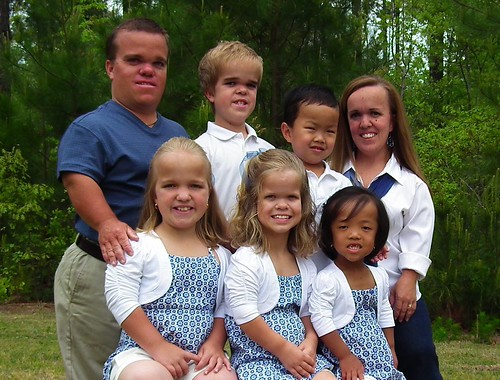Simple Autosomal Recessive
- TT-normal
- Tt-carrier
- tt-affected
- Albinism
- a defect of the gene that results in the absence of the pigments such as melanin
- pale skin, eye conditions, sensitive to the sun
- Cystic Fibrosis
- thick mucus in the lungs and digestive track
- one of the most common genetic disease in white Americans
- can be treated with physical therapy, special diets, drug therapies, and gene therapy
- Phenlyketonuria (PKU)
- caused by a missing enzyme that is needed to break down fats
- can cause severe mental retardation but all babies in U.S. are tested soon after birth
- Children that have this disease must have a special diet that does not have phenylalanine in it until they reach around 5 or 6
- Hereditary Deafness (Otosclerosis)
- Hitchhiker's Thumb

- Tay-Sachs
- Common in Jewish people
- this disease is caused by a missing enzyme that breaks down a lipid produced and stored in the tissues of the central nervous system
- The child dies by the age of 2 or 3
- no cure
-----------------------------------------------------------------------------------------------------------------------
Simple Autosomal Dominant
- TT, Tt-affected
- tt-normal
- No carriers
- Tongue Rolling

- Huntington's Disease
- the tissue in the middle of the brain begins to die
- symptoms begin between ages of 30-50
- these people lose control of their muscles.
- Cataracts
- the clouding of the lens of the eye
- Polydactyly (extra fingers or toes)
- Common - 1 in every 800 births
- See http://www.examiner.com/article/here-comes-honey-boo-boo-niece-s-duplicate-thumb-likely-caused-by-mutant-gene

- Achondroplasia (dwarfism)

Autosomal Dominant and Autosomal recessive Diseases:
- Some diseases are carried by dominant alleles (B), some are carried by recessive alleles (b).
- If the disease is carried by a dominant alleles, then the offspring need only inherit one allele to express the disease (BB or Bb).
- If the disease is carried by a recessive allele, then the offspring needs two recessive alleles to express the disease (bb).
- If a person has just one defective gene (Bb), then the person is known as a carrier. They will not express the disease but can pass it to their offspring. Only recessive alleles can be carried.
----------------------------------------------------------------------------------------------------------------------
Codominant Autosomal Recessive
- Sickle-Cell Anemia
- red blood cells are abnormal (have a crescent shape) blocking small blood vessels causing pain and anemia (low red blood cell count)
- pain, lethargy, anemia, organ failure, stroke
- common in African Americans
- TT-normal
- Tt-shows both normal and sickle cells - has few symptoms, however
- tt-all sickle cells
-----------------------------------------------------------------------------------------------------------------------
Sex-Linked Recessive (Carried on the X Chromosome)
- XcXc, XcY-affected
- XCXc-carrier, not affected
- XCXC, XCY-normal
- Colorblindness
- total or partial loss of ability to distinguish colors
- Hemophilia
- a disorder in which the blood does not clot properly
- Muscular Dystrophy
- the muscles atrophy (become smaller and no longer function properly)
- causes muscle weakness and loss of muscle tissue, which get worse over time
- Icyhyosis Simplex (dry, scaly skin)
Polygenic (Controlled by more than one gene)
- Skin, Hair, Eye color
- Foot size
- Nose length
- Height
Multiple Alleles (More than two alleles available in the gene pool)
- ABO Blood Groups
- Rh Blood Factor
------------------------------------------------------------------------------------------------------------------------
Chromosome Problems
Nondisjunction

- An extra chromosome of the 21st pair
- Caused by nondisjunction
- Mentally retarded
- Slanted Eyes
- Large, thick tongue
- Poor muscle tone
- Abnormal palm and foot prints
- Usually overweight
Kleinfelter Syndrome
- An extra X chromosome (XXY)
- Male
- Tall and thin
- Mentally retarded
- Abnormal breast tissue
- Caused by nondisjunction
- May appear normal
- Sterile
Turner's Syndrome
- Monosomy - missing X chromosome (X_)
- Caused by nondisjunction
- Immature sexual characteristics
- Mentally Retarded
- Sterile


- Linda Hunt of NCIS Los Angeles
Super Female; Triple X (XXX)
- Caused by nondisjunction
- Female
- An extra X chromosome (XXX)
- Good Athelete
- Mentally retarded to a certain extent
- Ewa Klobukowska, a 1964 Olympic sprint bronze medalist who was the first woman to fail the sex chromosome test during the 1967 European Cup. “One chromosome too many to be declared a woman for the purposes of athletic competition” was the statement, and she was obliged to return all her medals. She gave birth to a baby the following year.
- Also see a 2006 case: http://espn.go.com/olympics/story/_/id/8192977/failed-gender-test-forces-olympian-redefine-athletic-career-espn-magazine
Jacob's Syndrome (XYY)
- Caused by nondisjunction
- Male over six feet tall
- Persistent acne
- Speech problems
- Delayed maturity
- Extremely aggressive*
- High percentage are criminally insane
XXXY
- Caused by nondisjunction)
- Male
- Infertile
- Extremely agressive* behavior problems
- High Voice
- Male
- 48 Chromosomes
- See: http://xxyysyndrome.org/main/
Fragile X Syndrome
- caused by a gene mutation on the X chromosome (the expansion or lengthening of the FMR1 gene)
- When the gene lengthens it switches off production of a protein that is involved in brain development and other functions
- Usually severely affects males more than females
- mental retardation

--------------------------------------------------------------------------------------------------------------------------
Missing Pieces of Chromosomes
Prader-Willi Syndrome- part of chromosome 15 is missing, intellectual disability is common
- part of chromosome 4 is missing
- Children with this syndrome have profound intellectual disability
Cri du chat syndrome (cat's cry syndrome)
- part of chromosome 5 is missing
- heart defects are common
-------------------------------------------------------------------------------------------------------------------------
Detecting Genetic Disorders
- Amniocentesis is removing and testing a sample of amniotic fluid (the liquid that surrounds a fetus).
- Karyotype
- Can see if there are the correct number of chromosomes
- Ultrasound (sonogram) is using sound waves to determine the position and anatomy of the offspring.
- Fetoscopy is the direct observation of the fetus and surrounding tissues.
No comments:
Post a Comment